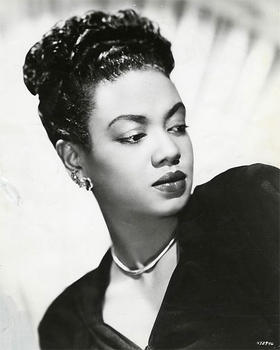A Tribute to Hazel Scott: To Thy Own Self Be True
This is a guest post by Howard Stone, founder and artistic director of The Vail Jazz Foundation. Stone’s articles appear bi-weekly in the Vail Daily during the summer months. 
I want to pay tribute to Hazel Dorothy Scott, a jazz pianist, singer and entertainer, not because of her prodigious musical talents (she was a remarkably gifted and dedicated musician), but because of her dedication to her ideals that epitomizes her strength of character and a commitment to honesty and integrity that we all too often pay lip-service to: “to thy own self be true.”
Scott’s story has rarely been told, but it deserves to be known by all as she was a remarkable person.
A music prodigy, Scott was born in Port of Spain, Trinidad and Tobago in 1920, and was brought to NYC at the age of four. By the time she was eight, she was attending the Juilliard School on scholarship and by her teens she was an accomplished pianist performing in a jazz band and on the radio.
Among her early credits were performances at the Roseland Dance Hall with the Count Basie Orchestra, Café Society’s “ From Bach to Boogie-Woogie” in Carnegie Hall and theatre appearances in the “Cotton Club Revue of 1938.”
Scott was equally comfortable performing classical and jazz (including blues and boogie-woogie) repertoire on the piano and singing ballads and Broadway tunes.
Scott felt strongly about civil rights and as her star power grew she had the opportunity to become more of an activist.
In the early 1940s Scott began making films in Hollywood and together with Lena Horne was the first African American woman to successfully demand that she not be cast as a singing maid or in other demeaning roles. Instead Scott played roles where she was cast as herself. Her film career with Columbia Pictures ended abruptly when she clashed with the studio over ‘‘a costume which she felt stereotyped blacks.”
By the mid-1940s, Scott was a major star earning $75,000 per year – equivalent to $1,000,000 per annum today – and her commitment to her ideals and civil rights were even more at the forefront of her ambition.
While touring in Texas, Scott refused to perform before a segregated audience and had to be escorted by Texas Rangers from the venue. After the incident she asked: “Why would anyone come to hear me, a Negro, and refuse to sit beside someone just like me?”
When she and a companion were refused service in a restaurant in Washington in 1949, Scott brought suit and inspired civil rights organizations to successfully pressure the state of Washington to pass legislation outlawing discrimination in public accommodations.
By 1950 she was the star of “The Hazel Scott Show,” the first African American woman to have her own television show and by all accounts she was sitting on top of the world, having conquered stage, screen, nightclubs and finally television, but storm clouds were gathering in the US and Scott was one of many caught up by the Red Scare of Joseph McCarthy.
Called before the infamous House Un-American Activities Committee to testify, Scott’s lifetime of hard work was destroyed in one afternoon. The week following her testimony, Scott’s television show was cancelled and her career began to decline and work became harder and harder to get.
By the late 50s with her career in shambles, Scott left the US for Paris and for the next decade she struggled to maintain her career, appearing in French films and touring periodically in Europe.
In 1967 with the Civil Rights Movement well underway, she returned home but never regained the career she once had. Playing occasional nightclub gigs, Scott began appearing in daytime television soap operas which she did until 1981, when she died of cancer at the age of 61.
Hazel Dorothy Scott paid a dreadful price for having the courage to stand up and fight for what she knew was right, but her commitment to her principles inspired countless others to defend their rights and paved the way for successive generations of people of color to have an equal opportunity in the film and entertainment industry and beyond!
https://youtu.be/ySQ8cA4a-f8
9(MDA3NDU1Nzc2MDEzMDUxMzY3MzAwNWEzYQ004))
Become a Member
Join the growing family of people who believe that music is essential to our community. Your donation supports the work we do, the programs you count on, and the events you enjoy.
Download the App
Download KUVO's FREE app today! The KUVO Public Radio App allows you to take KUVO's music and news with you anywhere, anytime!
